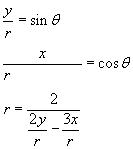Shutterbug424
New member
- Joined
- Oct 16, 2008
- Messages
- 40
[attachment=1:2u6d75mx]gunit.gif[/attachment:2u6d75mx]
[attachment=0:2u6d75mx]gunit2.gif[/attachment:2u6d75mx]
Should I have an r in my final answer?
I get 1 = (1/y) -(2/3x)
I don't know how to change that equation so the variables are on top.
[attachment=0:2u6d75mx]gunit2.gif[/attachment:2u6d75mx]
Should I have an r in my final answer?
I get 1 = (1/y) -(2/3x)
I don't know how to change that equation so the variables are on top.


